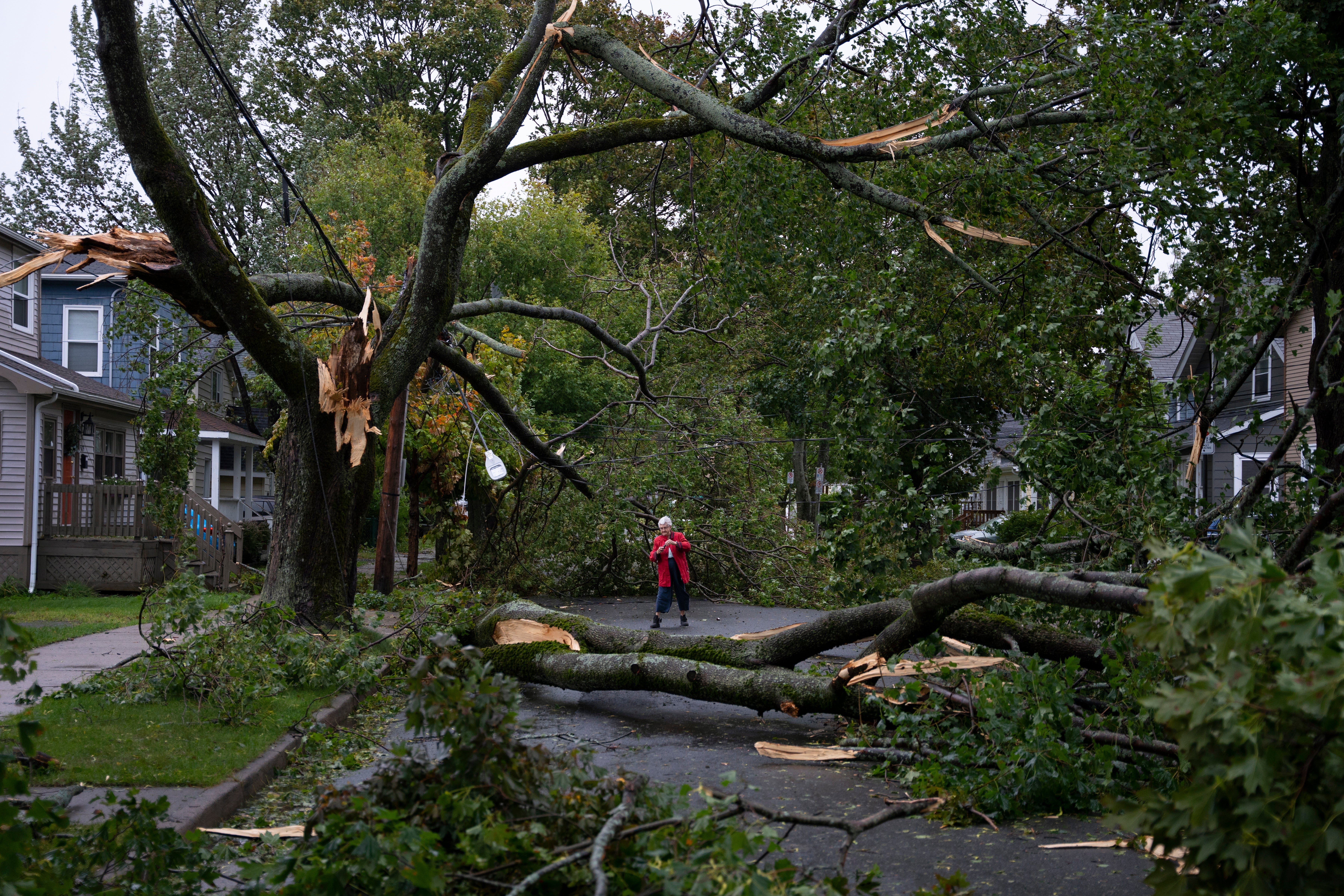Hurricane Fiona hits Nova Scotia with ‘historic, extreme event’ plunging 400,000 into darkness
Cape Breton mayor warns that it is ‘incredibly dangerous out there’ as residents urged to stay home
Your support helps us to tell the story
From reproductive rights to climate change to Big Tech, The Independent is on the ground when the story is developing. Whether it's investigating the financials of Elon Musk's pro-Trump PAC or producing our latest documentary, 'The A Word', which shines a light on the American women fighting for reproductive rights, we know how important it is to parse out the facts from the messaging.
At such a critical moment in US history, we need reporters on the ground. Your donation allows us to keep sending journalists to speak to both sides of the story.
The Independent is trusted by Americans across the entire political spectrum. And unlike many other quality news outlets, we choose not to lock Americans out of our reporting and analysis with paywalls. We believe quality journalism should be available to everyone, paid for by those who can afford it.
Your support makes all the difference.Hurricane Fiona has made landfall in Nova Scotia with the “historic, extreme event” plunging more than 400,000 residents into darkness, fuelling fears of flash flooding across Canada’s Atlantic Coast.
Fiona, which transformed into a powerful post-tropical cyclone late on Friday, struck the Canadian coast early on Saturday, lashing the region with strong rains and winds of up to 92mph (148 km/h).
Homes in its path were pummelled and power lines downed, leaving more than 415,000 residences in Nova Scotia – around 80 per cent of people in the province – without power on Saturday morning, according to the region’s power outage centre.
In the hard-hit province of Prince Edward Island, over 82,000 customers were affected, along with around 44,000 in New Brunswick.
Hurricane or tropical storm warnings were in place across much of Canada’s Atlantic coastline including Nova Scotia, Prince Edward Island, Newfoundland and New Brunswick and parts of Quebec, amid fears that up to 10inches (25cm) of rainfall could result in flash flooding.
On Saturday morning, a state of emergency was declared in the Cape Breton Regional Municipality (CBRM) in Nova Scotia, with officials urging residents to shelter in place and avoid all travel.
CBRM Mayor Amanda McDougall tweeted: “It is incredibly dangerous out there as Fiona’s hurricane winds continue in strength. Please stay home and stay safe. If you need to be evacuate phone 911.”
At least 20 people have already been forced to flee their homes in the region and take refuge in shelters which were set up on Friday in anticipation of the rare weather event.
One woman was rescued from her home in North Sydney after the heavy winds suddenly blew the roof off her house, reported local outlet CBC.
Meanwhile, a firefighter crew had a lucky escape in Halifax when a tree fell on their fire truck while they were inside.
Before Fiona made landfall in Canada, officials warned residents to prepare for what they described as a “historic” storm.
Bob Robichaud, Warning Preparedness Meteorologist for the Canadian Hurricane Centre, forecast that Fiona would reach around the same size but be stronger than Dorian was back in 2019.
“It’s certainly going to be an historic, extreme event for eastern Canada,” he said on Friday.

Canadian Prime Minister Justin Trudeau warned that it would be “bad” for parts of the country as he urged people to follow the guidance from the experts.
“It’s going to be a bad one,” he said on Friday.
“We encourage everyone to stay safe and to listen to the instructions of local authorities and hang in there for the next 24 hours.”
Fiona is expected to continue its path across the northeast coast on Saturday.
Canada is the latest nation impacted by Fiona, after it tore through the Caribbean, killing at least eight people.
One of the victims was a four-month-old baby who died as its mother was unable to reach a hospital becasue of roads being blocked.
The hurricane ploughed into Puerto Rico, the Dominican Republic and Guadeloupe this week, where thousands were left without power.
Five days on, more than half of Puerto Rico is still in darkness.
Fiona then lashed Bermuda with heavy rains and winds on Friday, and was downgraded to a post-tropical storm before reaching Canada.
Major hurricanes are rare in Canada, with the last severe weather event coming when Dorian made landfall as a post-tropical storm in 2019.
That storm largely tracked diagonally over central Nova Scotia and dropped nearly 140 millimetres of rain in some areas of the province.
Before that, Hurricane Juan hammered Nova Scotia in 2003, killing two people and wreaking extensive damage to the Halifax area.




Join our commenting forum
Join thought-provoking conversations, follow other Independent readers and see their replies
Comments